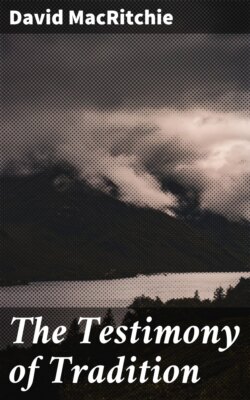Читать книгу The Testimony of Tradition - David MacRitchie - Страница 9
На сайте Литреса книга снята с продажи.
CHAPTER IV.
ОглавлениеTable of Contents
But, admitting the existence, at so recent a date, of a visibly "Eskimo" caste in some parts of the Hebrides, what evidence is there that any of these people found their way to Shetland? One writer, we have seen, brings the Shetland Finns all the way from Davis Straits, another draws them from Finland, and the Shetlanders themselves say that they "came ow'r fa Norraway," especially from the neighbourhood of Bergen. The correctness of this last belief need not be questioned, as regards some of that caste. But it has been suggested in the foregoing pages that many of those "Finns" who persecuted the Shetland fishermen were those kayak-using Hebrideans who avowed their ancient right to despoil and to exact tribute from others, not only when fishing among "the Isles where they dwell," but in other waters.
We read[49] of raids made in the Orkneys and Shetland, during the latter part of the fifteenth century, by "bands of Islemen" (i.e., Hebrideans), "Irish, and Scots, from the woods"; which last term strongly suggests the "robber" denizens of the thickly-wooded islands spoken of by Buchanan two centuries later. The raiders were, no doubt, heterogeneous. But the piratical kayak-men were surely among them. There are many traditions extant in some parts of the north-eastern archipelagos regarding these raids—in the island of Westray, in Orkney, for instance, where, at a certain "Fitty Hill," there was once a great fight between the Westray people and the invading Lewismen, all of whom were slain. Now, this Fitty Hill is associated strongly with the people recognizable as "Finns," or at least was so in the year 1701, according to a writer previously quoted (Brand, p. 57), and both he and Wallace (who wrote in 1688) mention the frequent visits of Finn-men to the Westray fishing-grounds. Indeed, the kayak preserved in Edinburgh seems, according to the latter writer, to have been one of those secured by the Orkneymen; who probably made sure that the Finn himself should have no further use for it.
Thus, it is a simple historical fact that certain castes of the Hebrideans, whose practice of despoiling and exacting tribute from others was a thing beyond question, were very frequent visitors to the Orkney and Shetland groups, whose natives they did their utmost to overawe. And, as the skin skiffs of the Hebrideans were of such a description that the skiffmen "fearlessly committed themselves in these slight pinnaces to the mercy of the most violent weather," they were well qualified to sing the song of the Finn-man:
